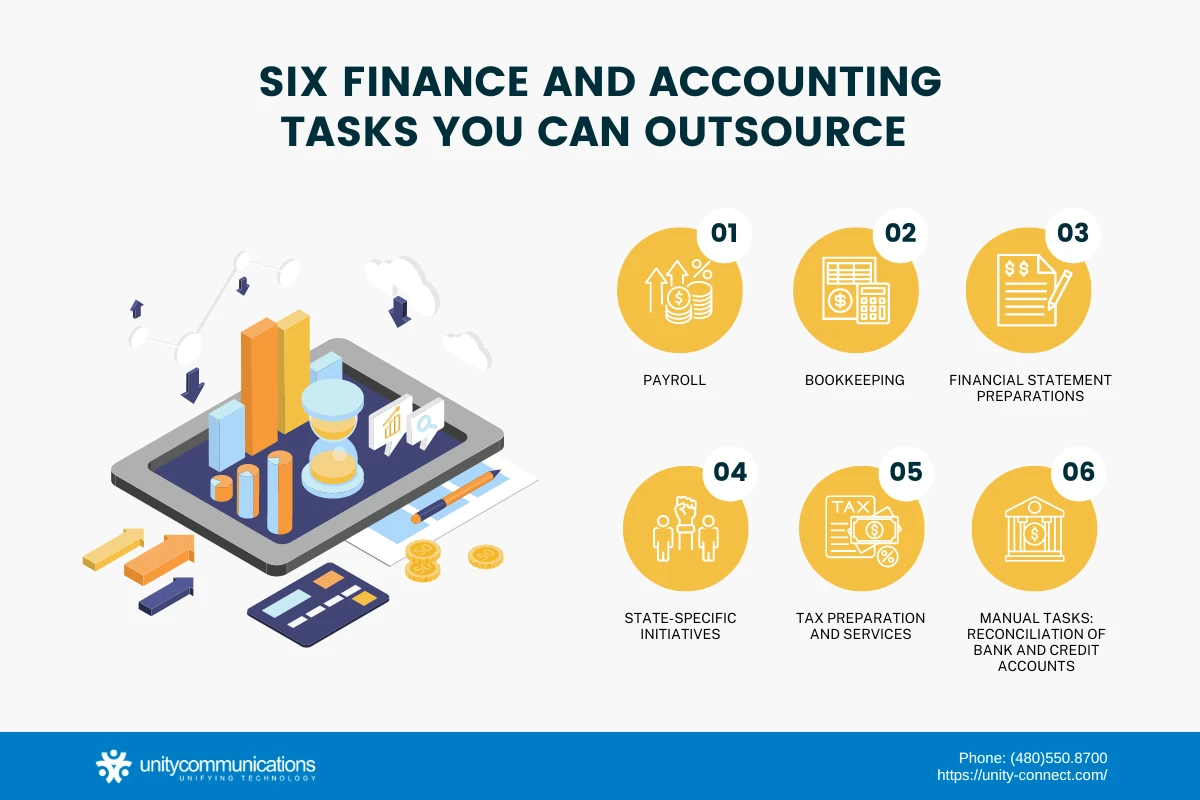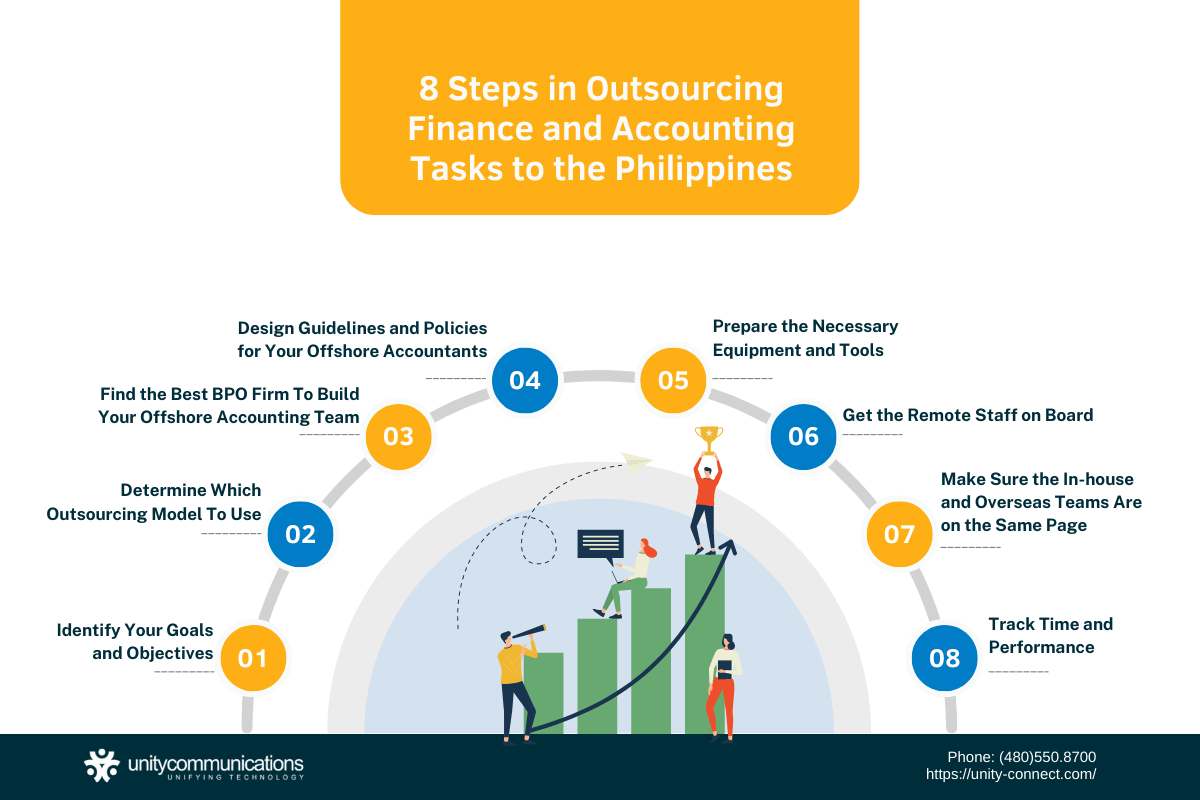IN THIS ARTICLE
Table of Contents
Hiring proficient, reliable accountants is expensive and time-consuming. Finance and accounting outsourcing to the Philippines offers a faster and better solution for your business needs.
Why should you tap into an offshoring provider in the Philippines? It gives you access to a team of skilled global talent for a fraction of the price of in-house certified public accountants (CPAs).
This guide discusses finance and accounting outsourcing, the services you can outsource offshore, and the benefits of working with a Philippine business process outsourcing (BPO) provider. It also talks about when and how to get started with outsourcing.
What Is Finance and Accounting Outsourcing?
Business process outsourcing means hiring an external vendor to manage supplementary processes that support core operations. Finance and accounting are among these secondary functions you can partly or completely outsource to a third party.
Companies can outsource finance and accounting in many ways. Some outsource the entire function by hiring accountants to fill an offshore department. Others keep important finance tasks in-house while outsourcing manual activities such as accounts receivable and payable management.
Finance and Accounting Outsourcing vs. Offshoring to the Philippines
When you say “outsourcing,” it simply means delegating work to a third-party team. Outsourcing takes several forms: onshore, nearshore, and offshore outsourcing. Offshoring, in the original sense of the word, means moving business functions to another country overseas and is not necessarily synonymous with outsourcing.
But the word “offshoring” has become a blend between the terms “offshore” and “outsourcing.” Hence, offshoring is also a type of outsourcing that involves partnering with a vendor from a distant country.
Companies struggling with tight budgets or expensive labor markets can leverage the offshore approach. They can get more manpower through labor outsourcing in the Philippines, for instance.
Six Finance and Accounting Tasks You Can Outsource to the Philippines

The Philippine BPO industry is popular for customer service solutions and data entry services. Service providers in the country are also competitive in finance and accounting functions. Many foreign businesses rely on Philippine BPO companies to manage their finances.
Accounting is repetitive and cumbersome, but it still requires careful management. This section lists the accounting tasks you should outsource.
1. Payroll: Effortlessly Manage Employee Compensation
Are you struggling with managing your employees’ salaries, bonuses, and incentives? You can try finance and accounting outsourcing to the Philippines. Offshore accountants can help you save time, comply with tax regulations using payroll software, and reduce errors with the help of powerful accounting tools.
Payroll tasks to outsource:
- Timekeeping
- Employee compensation
- Employee benefits and other monetary bonuses
- Wage surges
- Withholding tax on compensation
2. Bookkeeping: Achieve Precise Entries for Accurate Records
Clients commonly outsource bookkeeping, which is unsurprising given its workload. Bookkeeping tracks, organizes, and classifies a business’ daily financial activities. So clients can easily transfer this function to an offshore back-office outsourcing provider to focus on more important tasks.
Bookkeeping tasks to outsource:
- Collections
- Accounts receivable
- Accounts payable
- Invoicing
- Internal reporting
- Financial reporting
3. Financial Statement Preparations: Keep Data Organized and Accessible
Preparing financial statements can sometimes be overwhelming. If that is your experience, Philippine BPO firms are ready to assist you. Third-party accountants can properly and transparently prepare your financial information so that you can deal with them more easily.
Financial statement tasks you can outsource:
- Post account balances
- Balance sheet and cash flow preparation
- Value inventory
- Financial statement issuance
4. State-specific Initiatives: Simplify Sales Tax and Maximize Profits
Some businesses struggle with sales tax payments, especially if they must report taxes on the city and state levels. To avoid costly blunders, companies must correctly report and pay for these fees, which is complicated for an organization in high-taxed areas. Offshore accountants can help handle sales taxes so that the in-house team can focus on critical activities.
State-specific tasks to outsource:
- Property taxes
- Use taxes
- Sales tax filing and payment
5. Tax Preparation and Services: Avoid Costly Errors, Maximize Returns
Tax preparation is difficult and time-consuming. Failure to prepare your taxes can lead to business closure.
Because tax preparation is prone to errors, business owners tend to avoid it. Even when they do it properly, they tend to get the nagging feeling that they might have lost money due to unutilized write-offs. Finance and accounting outsourcing to the Philippines can help.
Taxation tasks to outsource:
- Issuing 1099 and W-2 forms
- Filing of local and state tax
- Filing of new hiring report to the state
- Mailing of receipts to charitable donors
6. Manual Tasks: Boost Efficient and Accurate Accounting
Manual accounting is also prone to mistakes. Although offshore accountants are not immune to errors, they make fewer mistakes than business owners or employees because they follow additional checks designed to detect inaccuracies. They also have more support to call on when performing the task.
Manual tasks to outsource:
- Reconciliation of bank and credit accounts
- Unique payment terms and credit agreements with clients
Benefits of Offshoring Finance and Accounting to the Philippines

Outsourcing finance and accounting to the Philippines is gaining traction. The nation’s BPO industry has shown a strong growth rate in the past few years with no signs of slowing down. Part of its success is due to its talented pool of workers and incredible government support.
Here are five more reasons the Philippines makes a great offshore accounting destination:
- Readily available workforce. The country is home to over 175,000 CPAs. Accountancy is one of the top choices for college students in the Philippines. An average of 8,200 accountancy graduates pass the CPA Licensure Exam each year, supplying employers with a vast pool of candidates during recruitment.
- Continuous learning for CPAs. Philippine law requires accountants to take additional training units after receiving their licenses. They need 120 units to prove their technical competency, professional skills, and values. This is to ensure CPAs remain up to date with industry developments.
- Professional and educational parallel to the United States. Outsourcing accounting tasks to the Philippines is somehow similar to handling the task in-house. The two countries share similar accountancy programs. They are also members of the International Federation of Accountants (IFAC), which manages the standardization of processes.
- Easy resolution of onshore accountant shortage. The U.S. is experiencing a 17% decline in accounting talent as current CPAs plan to retire in the coming years, and most graduates refuse to work in the industry. In contrast, the accounting talent pool in the Philippines is gaining momentum as more people enter the field.
- Cost-effective service. Outsourcing to the Philippines gives companies up to 70% savings on labor costs. This is due to currency exchange rates and the country’s cost of living, which is 30% lower than in other countries.
Look no further than the Philippines when outsourcing finance and accounting offshore. The country is cost-effective and has many friendly and educated accountants ready to take on the work for you.
Six Signs You Need To Outsource Accounting and Finance

An offshore accounting team can perform many tasks, from accounts management to tax accounting and chief financial officer (CFO) advisory. Your contractors serve as an extension of your in-house team and help you accomplish tasks from anywhere in the world.
The following are some indicators that you need to leverage finance and accounting outsourcing to the Philippines.
1. Accounting Is Not Part of Your Core Business
Have you tried writing with your non-dominant hand? You might be able to write a sentence, but not as easily or legibly as when you write with your dominant hand.
This analogy shows why you should outsource a function that is not one of your core competencies.
Outsourcing finance and accounting tasks to Philippine BPO companies eliminate the need to learn more about tax laws and codes. As a result, the in-house team has more time to concentrate on what they do best.
2. You Need To Save on Costs
You can save on costs by outsourcing finance and hiring an overseas accountant. You no longer need to pay for additional office supplies, salaries, or taxes. You need not spend money on recruitment, training, and onboarding because the offshore BPO provider handles those processes.
You also save money by outsourcing finance and accounting to the Philippines, where the workforce and resources are more affordable. This business plan significantly reduces your expenses compared to having a dedicated in-house accountant.
3. You Need Help With Peak Season Workload
Your in-house staff members are busy. They might have the time only to audit your business’ financial records at the end of the year, piling up their workload. Employees could experience sudden stress due to the amount of work and make more errors than usual.
Outsourcing finance and accounting duties to an offshore team lets you offload manual tasks such as bookkeeping, trial balance preparation, auditing, financial reporting, management information system (MIS) reporting, and tax calculation. Thus, you can reduce the pressure on your in-house accountant and ensure your books are free from inaccuracies.
4. You Need To Catch up With Technology
In 2019, the International Revenue Service (IRS) introduced its plan to build infrastructure and modernize key systems to improve the taxpayer’s experience. The plan aims to significantly improve work efficiency and data security by 2026. Modernization involves the deployment of smart technologies such as:
- Application programming interfaces (APIs)
- Robotic process automation (RPA)
- Development and operations (DevOps)
- Cloud computing
- Agile infrastructure
The plan will push through despite funding challenges, primarily because of the increased demand to phase out legacy systems. This modernization plan from the IRS will surely impact every taxpayer. Thus, companies must keep up with modernization to improve business efficiency and easily comply with IRS regulations.
The problem is whether you have the resources and time to procure new infrastructure and tools. We live in a time of technological advancements; keeping pace is inevitably expensive. The best way to prepare for future developments is to leverage the resources offered by finance and accounting outsourcing companies in the Philippines.
5. You Need To Concentrate on In-house Team Priorities
As your business grows, you have an increased workload, which might exceed your control over time. This can overtax you and your in-house team. Heavy workloads can affect your company more than you think, especially if it influences your staff’s quality of work and output.
Offshore finance and accounting solutions help ease the workload while empowering your organization to grow faster. The result is higher-quality work and additional profit.
6. You Struggle To Find Local Accounting and Finance Talent
You might find that your local talent pool lacks top-tier accountants. A low unemployment rate or talent shortage might make it harder to find the right candidate.
Access to a vast offshore talent pool is one of the perks of finance and accounting outsourcing to the Philippines. BPO providers match you with world-class professionals at a fraction of the cost of hiring local staff.
You can also outsource a fraction of your department. For example, one in-house accountant can prepare financial statements each quarter and handle state-specific tasks. At the same time, offshore bookkeepers\ regularly manage your inventories and books.
Eight Steps in Outsourcing Finance and Accounting to the Philippines

Whether it be a contact center as a service (CCaaS) or accounting solutions, you must plan and prepare thoroughly before contacting a BPO provider. Here is a step-by-step guide to outsourcing finance and accounting tasks to the Philippines.
1. Identify Your Goals and Objectives
The first thing you must do when building an offshore accounting team is to identify your goals and desired results. Incorporate benchmarks or target results such as timely billing, regular financial reporting, and a manageable accounts receivable collections ratio.
Additionally, you can include other key performance indicators (KPIs) for your organization’s valuation, profitability, efficiency, leverage, and liquidity.
2. Determine Which Outsourcing Model To Use
Outsourcing models can be classified into two: dedicated and functional.
Dedicated
- Under this model, the remote service provider is the middleman, searching for workers who can accomplish the project demands set by the client.
- A dedicated approach is ideal if you plan to offload non-specialized tasks such as bookkeeping and financial statement preparation.
- General activities can be completed by any worker who satisfies the minimum qualifications of the role.
Functional
- This model lets the offshore BPO provider handle specific duties on behalf of the client.
- A functional model is best if you outsource specialized activities such as tax compliance and accounting.
- Tasks that involve a high level of confidentiality and expertise are better outsourced using this approach. Putting them in the hands of a reliable offshore provider helps protect your business data.
Whether you plan to outsource tech solutions or finance, you must find the best business approach. Consider your market landscape, budget, and business goals when deciding which model to use.
3. Find the Best BPO Firm To Build Your Offshore Accounting Team
You discover many finance and accounting outsourcing providers in the Philippines with a simple Google search or through LinkedIn. Look for BPO providers with a good track record of scouting and hiring accountants.
Remember to read reviews from current and previous clients. Their experience tells you how easy or hard it is to work with the service provider. You can also request referrals from reliable business colleagues and partners.
Once you find prospective providers, short-list vendors based on your non-negotiable requirements. Look at each company’s website and check their business portfolio. Lastly, make your final decision based on your research.
4. Design Guidelines and Policies for Your Offshore Accountants
Next, you want to create standard operating procedures (SOPs). These can help minimize errors, enhance output quality, and improve work efficiency.
Before writing your guidelines for the remote team, check each accountant’s work. From there, you can identify your objectives and tactics for increasing productivity.
SOPs and policies empower your finance and accounting outsourcing staff in the Philippines to understand their duties and responsibilities.
5. Prepare the Necessary Equipment and Tools
Preparing the required tools and equipment helps improve your organization’s productivity. These tools might include standard bookkeeping software, accounting apps, invoicing tools, communication tools, and tracking software.
One problem with finance and accounting outsourcing to the Philippines is that keeping communication open is hard because your accounting team is a thousand miles away. Fortunately, tools are available to help you track work progress, monitor staff, and maintain communication.
A project management tool is a centralized space to plan, run, and manage outsourced work. It can help you:
- Plan and delegate work;
- Assess and track the progress of each project; and
- Store and organize relevant documents and files.
Communication tools are vital if you want team members to stay on track. They help you communicate project updates, demands, and recommendations with the offshore team, plus:
- Exchange progress updates and project data;
- Create channels for topic-specific conversations;
- Conduct virtual meetings; and
- Share screen for detailed planning.
Giving your overseas accounting staff proper tools helps them deliver quality output on time. The right communication equipment lets you stay in touch with your offshore team for easier monitoring. Investing in the right tools can increase profitability and maximize business opportunities.
6. Get the Remote Staff on Board
Before the remote accountants start working for your organization, conduct several training and onboarding sessions so that they can learn your objectives and processes. Although the staff underwent training given by the BPO provider, walking them through your company’s values and culture ensures alignment.
Onboarding sessions help rapidly improve skills and facilitate a smoother transition, contributing to overall productivity. You can also use customized portals and online employee handbook tools to make the transition process smoother and more efficient.
7. Make Sure the In-house and Overseas Teams Are on the Same Page
Having your finance and accounting teams work together improves morale and expedites task completion. It encourages unique perspectives, generating more innovative and diverse business solutions.
You can have a channel or portal where both parties can communicate, discuss, and resolve problems. Another alternative is an internet protocol (IP) phone system with designated extension numbers for seamless interaction. This brings the two teams closer together, making it easier to achieve the desired targets.
8. Track Time and Performance
Time tracking is crucial when outsourcing since teams work on a project basis with multiple clients. Tracking the hours worked ensures client companies are billed correctly. It also helps them verify the claims made by the third-party team.
You can use time or performance tracking software to get real-time updates on the workload and task progress of your finance and accounting outsourcing team in the Philippines. With it, you can also:
- Check how productive the offshore accountants are;
- Verify how long it takes to complete projects;
- See idle time passing as work hours; and
- Know whether billing is only for work completed.
Tracking staff performance helps you identify when employees go above and beyond. It also helps realign goals by giving you insights into areas where someone is doing well and where further improvement is necessary.
Lastly, monitoring makes a worker more productive. It reduces the number of errors made while allowing for a greater, more efficient use of their time.
Other Tips for Outsourcing Finance and Accounting to the Philippines

Outsourcing has driven growth across various industries for years, providing a holistic solution that combines technology, people, and process. Finance and accounting outsourcing to the Philippines equips companies with skilled professionals to manage their financial health, deliver accurate and timely results, and provide strategic business advice.
To fully leverage the benefits of offshore outsourcing, follow the tips below.
1. Make Information Exchange Easy
Sending sensitive financial and tax data via email has inherent risks. Hence, you need a secure platform for information exchange. An accounting software package can help you:
- Improve security and save space by privately storing and accessing your attached documents and files online
- Save time searching for documents needed by you or your offshore accountants
- Access financial records anytime, anywhere and discreetly share documents with colleagues
- Remain organized by uploading spreadsheets, estimates, and scanned receipts
QuickBooks is suitable for this; it helps you manage financial records. When looking for similar software, prioritize features such as private digital vaults and secure attachments. Ensure the system is easy to use and has quick access to financial records.
2. Perform Regular Process Reviews and Training Sessions
Regularly communicating with your team is a must to ensure efficient accounting processes.
Ask your in-house team to demonstrate their daily procedures to discover points for improvement. Analyzing your everyday operations uncovers unnecessary, redundant, or inefficient steps and processes.
After this review, look for ways to optimize your operational processes with your in-house and offshore teams. This is also a great opportunity to perform training sessions with the team if you find knowledge and skill gaps.
3. Look for Customized Solutions
Your BPO service provider should be able to offer you custom-made solutions. For instance, your business is in the U.S., but you have a team of offshore accountants. Your remote team should understand federal and state rules to guarantee legal compliance.
Partnering with a customer-centric finance and accounting outsourcing collaborator from the Philippines helps you accomplish the task according to your business needs.
4. Consider the Following Factors
The Philippines is home to many BPO companies, but not all are equal in service quality and capability. Whether it be accounting or technical support outsourcing, you should pick a service provider with a cost-effective solution, a reliable track record, and robust infrastructure.
Here are some factors to look for:
- Reasonable price. Your potential vendor should have a reasonable service charge without sacrificing quality. You should be able to save on costs while receiving quality service. The Philippines is a popular BPO destination because of its more affordable pricing than its European counterparts.
- Qualified staff. The service provider must have a roster of trained accountants to guarantee timely deliverables. Verify whether the talent has the required accounting degrees, certifications, and licenses. If the offshore provider satisfies this criterion, they are more likely to efficiently meet your demands.
- Proven track record. The BPO provider must have a proven track record for the function you outsource. Check whether they have received awards for their services. Read testimonials, reviews, and ratings from previous and existing clients. These steps verify whether the provider follows compliance requirements or industry standards.
- Cultural parallels. Cultural similarity is crucial in outsourcing success. Your remote accountants are just as much part of the team as your in-house employees. For example, the Philippines has many cultural parallels to Western companies, from lifestyle to preferences in trade and investment.
Cost of an Offshore Finance and Accounting Team in the Philippines
An average bookkeeper in the U.S. makes $4,281 monthly without considering overhead costs.
Conversely, you can expect to pay $8.50 per hour for outsourced bookkeepers. At that rate, you will be paying $1,360 for a full-time contractor who works eight hours a day for five days a week. A more experienced bookkeeper or one with a background in financial analysis might charge $10 per hour, which can cost you $1,600 per month.
With outsourced bookkeeping, you no longer have to worry about overhead expenses, including office rental or tax fees, which cost thousands if you operate in the U.S. Note that the prices above are subject to change and negotiation; we provide only a benchmark.
Your budget plays a vital role in outsourcing. The standard pricing models used for offshore outsourcing include the following:
- Fixed prices. This approach involves parties agreeing on a set cost for the service rendered within a particular period. A fixed-price model gives you more control over your budget with no surprise charges. The downside is there is little room for flexibility, which might not be ideal for complicated projects.
- Time and material. This is the opposite of the fixed-price approach. You are billed based on time and resources consumed. The time and material model gives you more control over the results and facilitates flexibility. But it requires more project management and has the risk of disputes.
- Incentive-based. An incentive-based scheme encourages the BPO provider to go above and beyond. It also fosters stronger partnerships and facilitates relativity. However, it is not ideal for smaller companies. Risks of disagreements and tension are also present.
- Shared risk-reward model. The vendor and the vendee share responsibility for gains and losses under this model. A shared risk-reward model is good because it keeps the vendor committed to the project. The only downside is that it needs precise accountability guidelines.
The Bottom Line
Finance and accounting outsourcing to the Philippines offers many benefits. It empowers in-house teams to concentrate on core activities, improves productivity, and enhances profitability as remote teams deliver timely results.
Outsourcing financial services offshore gives you a complete accounting department experience without the expense and hassle of the in-house recruitment process. You can leverage experienced and knowledgeable accounting professionals who can take the financial chores off your plate and free up your time.
Look no further if you are looking for a reliable BPO company. Unity Communications offers top-of-the-line solutions. Get in touch with us now to start hiring accountants for your offshore project.





